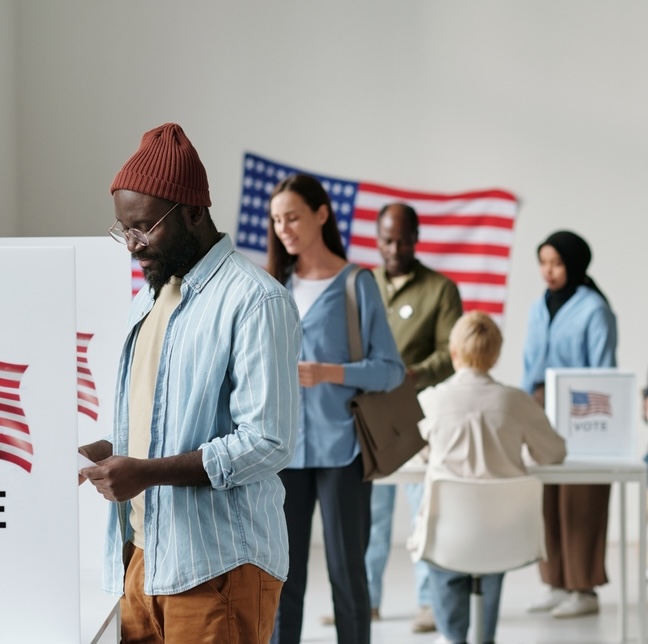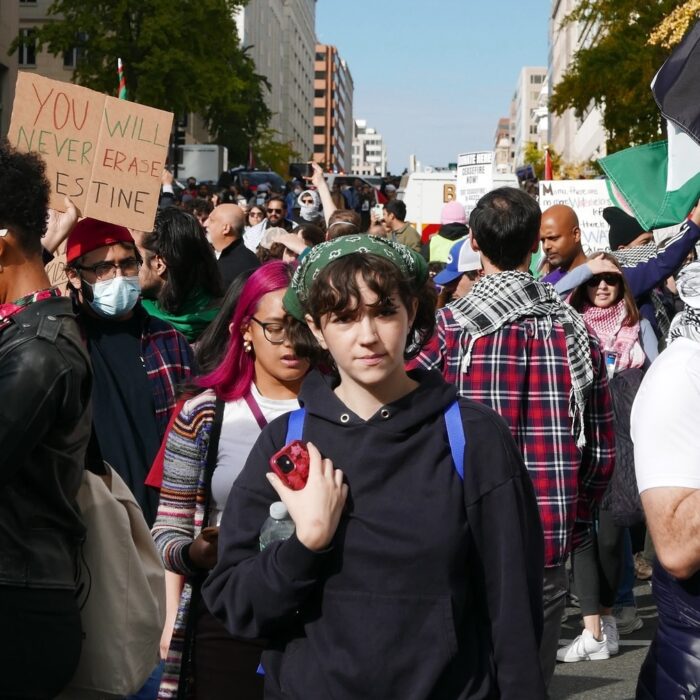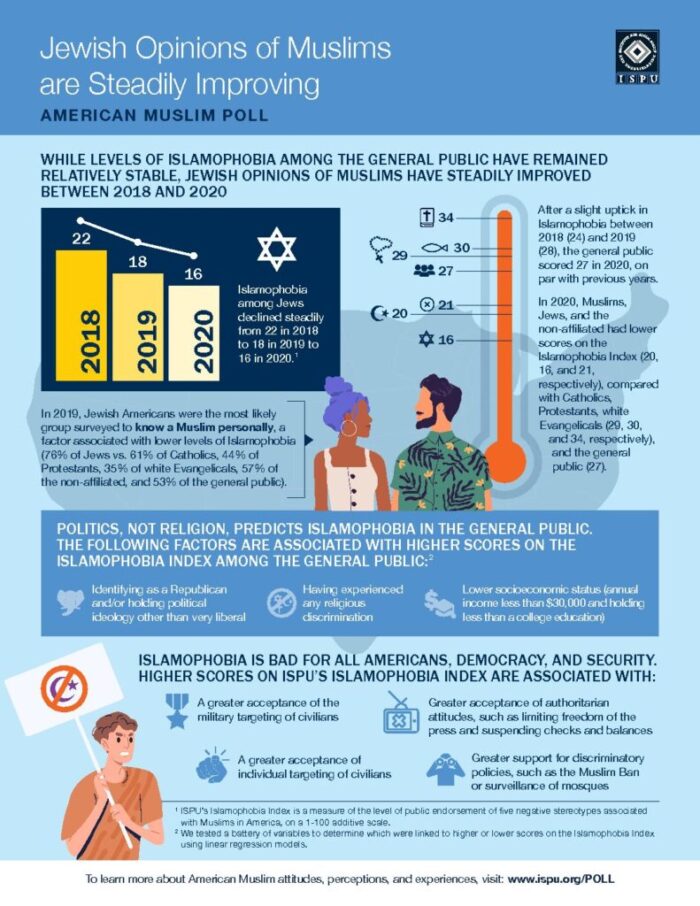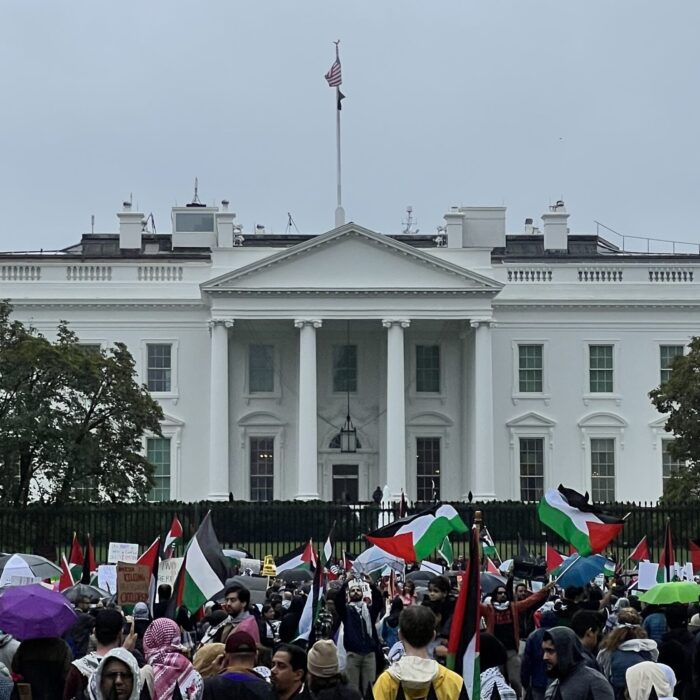
Opinion: Perpetuating Islamophobia by Policing Student Protesters
May 15, 2024 | BY SAHER SELOD, PHD
As a university professor, I am shocked at the number of college administrators who have called the police on faculty and students for protesting. During one weekend in April alone, over 100 students were arrested and by the middle of May there have been about 3,000 arrests. But as a scholar of the racialization of Muslims via their surveillance I am not entirely surprised. What is confounding, is that institutions that often tout social justice values and a commitment to diversity, equity, and inclusion are at the same time criminalizing the same students who have been inspired to protest, often because of what they have been taught while in college.
The banning of a South Asian Muslim student, who was named valedictorian, from speaking at commencement due to her pro-Palestinian social media posts led to students setting up encampments on campus. The student, Asna Tabassam, minored in resistance to genocide at USC. The university cited safety concerns as justification for their decision. USC responded to student protests by canceling the main graduation ceremony, drastically revamping commencement.
At the same time that students are being penalized with suspensions and expulsions for their activism and faculty with arrests for protecting their students, universities are trying to put together programming on antisemitism and Islamophobia as a way of addressing concerns and building understanding. I, along with other colleagues who have been studying anti-Arab and anti-Muslim racism for decades, have been invited to talk about the history of Islamophobia and surveillance of Muslims as these institutions scramble to understand their Muslim students’ increasing complaints about the racism they are experiencing as events in Israel and Palestine roil American college campuses.
Dr. Evelyn Alsultany argues in her book Broken: The Failed Promise of Muslim Inclusion, that these initiatives, in many cases coming from DEI offices, address Islamophobia only in moments of crisis, otherwise ignoring Muslim encounters with discrimination and bias. Unfortunately, we are in crisis again.
Over the past year, the Council on American Islamic Relations (CAIR) fielded over 8,000 complaints of anti-Muslim bias, the highest number the organization has ever received, according to their Civil Rights Report. More than half of the complaints registered occurred since October 7.
The Institute for Social Policy and Understanding (ISPU), where I serve as director of research, recently published a report on Muslim and Jewish experiences with discrimination. Our findings show the majority of Muslims (74%) and Jews (66%) reported experiencing some frequency of bias, with 14% of Muslims, 7% of Jews, and 7% of the general population reporting that the discrimination occurs “regularly.” But one area where Muslims stand apart is where the discrimination occurs. Muslim students (61%) compared to Muslims who are not students (44%) responded they experienced discrimination occasionally or regularly. This data reflects the anti-Muslim and anti-Palestinian experiences students are contending with on college campuses.
As a scholar of the racialization of Muslims, I recognize that we do have to understand and distinguish how anti-Palestinian racism differs from anti-Muslim racism. However, they do overlap. The association of Muslims with terrorism has long been established by scholars as one of the ways they are racialized. My research shows that counterterrorism policies rely on the connection of Muslims with terrorism, validating their global surveillance and hyper policing. Similarly, the association of Palestinians with terrorism, has justified the ongoing military campaign against them.
At this moment, some college campuses are treating those who are protesting in favor of human rights for Palestinians as Hamas sympathizers, marking them as supporters of terrorism, something that Muslims in the United States have had to contend with since the onset of the Global War on Terror. In fact, the House Oversight and Accountability Committee and the Committee on Education and Workforce have requested the Treasury Secretary to investigate “multiple leftist organizations are leading efforts to fund and encourage” protesters on college campuses, which they have marked as anti-American and pro-Hamas. Thus, it is not surprising that students and faculty on college campuses are met with policing while peacefully protesting against a military campaign that the majority of Americans, including Jews and Muslims, do not support.
Colleges and universities are walking a thin line when it comes to addressing the rising complaints of Islamophobia on their campuses, while simultaneously being perpetrators of it.
In a speech at Spelman College, Princeton University Professor Ruha Benjamin, noted how universities honor student activism long after their alumni graduate, while penalizing them as they participate in organizing during their time on campus. While Asna was met with a standing ovation by her classmates at commencement, she was still banned from giving her valedictorian speech by the university. Only time will tell if Asna’s activism will one day be rewarded by USC, long after she graduates. It will first take the recognition that part of Muslim racialization is tied to the idea that they incite security.
The politicized and highly publicized Congressional hearings featuring university presidents and their response to antisemitism has contributed to this increase in policing, arrests, suspensions, and expulsions. In this moment, we need to question the role of universities in perpetuating Islamophobia by criminalizing pro-Palestinian student activism.
RELATED RESOURCES
- 09 February, 2024

Perpetuating Islamophobia by Policing Student Protesters
May 15, 2024 | BY SAHER SELOD, PHD
As a university professor, I am shocked at the number of college administrators who have called the police on faculty and students for protesting. During one weekend in April alone, over 100 students were arrested and by the middle of May there have been about 3,000 arrests. But as a scholar of the racialization of Muslims via their surveillance I am not entirely surprised. What is confounding, is that institutions that often tout social justice values and a commitment to diversity, equity, and inclusion are at the same time criminalizing the same students who have been inspired to protest, often because of what they have been taught while in college.
The banning of a South Asian Muslim student, who was named valedictorian, from speaking at commencement due to her pro-Palestinian social media posts led to students setting up encampments on campus. The student, Asna Tabassam, minored in resistance to genocide at USC. The university cited safety concerns as justification for their decision. USC responded to student protests by canceling the main graduation ceremony, drastically revamping commencement.
At the same time that students are being penalized with suspensions and expulsions for their activism and faculty with arrests for protecting their students, universities are trying to put together programming on antisemitism and Islamophobia as a way of addressing concerns and building understanding. I, along with other colleagues who have been studying anti-Arab and anti-Muslim racism for decades, have been invited to talk about the history of Islamophobia and surveillance of Muslims as these institutions scramble to understand their Muslim students’ increasing complaints about the racism they are experiencing as events in Israel and Palestine roil American college campuses.
Dr. Evelyn Alsultany argues in her book Broken: The Failed Promise of Muslim Inclusion, that these initiatives, in many cases coming from DEI offices, address Islamophobia only in moments of crisis, otherwise ignoring Muslim encounters with discrimination and bias. Unfortunately, we are in crisis again.
Over the past year, the Council on American Islamic Relations (CAIR) fielded over 8,000 complaints of anti-Muslim bias, the highest number the organization has ever received, according to their Civil Rights Report. More than half of the complaints registered occurred since October 7.
The Institute for Social Policy and Understanding (ISPU), where I serve as director of research, recently published a report on Muslim and Jewish experiences with discrimination. Our findings show the majority of Muslims (74%) and Jews (66%) reported experiencing some frequency of bias, with 14% of Muslims, 7% of Jews, and 7% of the general population reporting that the discrimination occurs “regularly.” But one area where Muslims stand apart is where the discrimination occurs. Muslim students (61%) compared to Muslims who are not students (44%) responded they experienced discrimination occasionally or regularly. This data reflects the anti-Muslim and anti-Palestinian experiences students are contending with on college campuses.
As a scholar of the racialization of Muslims, I recognize that we do have to understand and distinguish how anti-Palestinian racism differs from anti-Muslim racism. However, they do overlap. The association of Muslims with terrorism has long been established by scholars as one of the ways they are racialized. My research shows that counterterrorism policies rely on the connection of Muslims with terrorism, validating their global surveillance and hyper policing. Similarly, the association of Palestinians with terrorism, has justified the ongoing military campaign against them.
At this moment, some college campuses are treating those who are protesting in favor of human rights for Palestinians as Hamas sympathizers, marking them as supporters of terrorism, something that Muslims in the United States have had to contend with since the onset of the Global War on Terror. In fact, the House Oversight and Accountability Committee and the Committee on Education and Workforce have requested the Treasury Secretary to investigate “multiple leftist organizations are leading efforts to fund and encourage” protesters on college campuses, which they have marked as anti-American and pro-Hamas. Thus, it is not surprising that students and faculty on college campuses are met with policing while peacefully protesting against a military campaign that the majority of Americans, including Jews and Muslims, do not support.
Colleges and universities are walking a thin line when it comes to addressing the rising complaints of Islamophobia on their campuses, while simultaneously being perpetrators of it.
In a speech at Spelman College, Princeton University Professor Ruha Benjamin, noted how universities honor student activism long after their alumni graduate, while penalizing them as they participate in organizing during their time on campus. While Asna was met with a standing ovation by her classmates at commencement, she was still banned from giving her valedictorian speech by the university. Only time will tell if Asna’s activism will one day be rewarded by USC, long after she graduates. It will first take the recognition that part of Muslim racialization is tied to the idea that they incite security.
The politicized and highly publicized Congressional hearings featuring university presidents and their response to antisemitism has contributed to this increase in policing, arrests, suspensions, and expulsions. In this moment, we need to question the role of universities in perpetuating Islamophobia by criminalizing pro-Palestinian student activism.
RELATED RESOURCES
- 09 February, 2024

Saher Selod, PhD, is the Director of Research for the Institute for Social Policy and Understanding and an Associate Professor of Sociology at Simmons University. She is the author of Forever Suspect: Racialized Surveillance of Muslim Americans in the War on Terror and A Global Racial Enemy: Muslims and 21st-Century Racism. Learn more about Saher→







